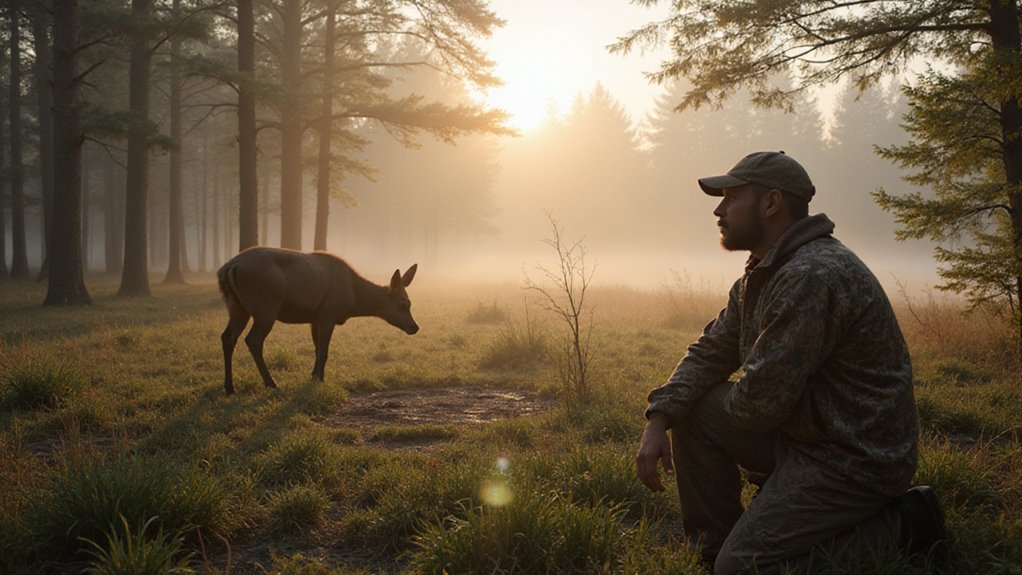As a hunter, understanding and adhering to ethical principles is essential for both your experience and the preservation of wildlife. By respecting habitats, ensuring fair chase, and following safety protocols, you contribute to a sustainable future for hunting. But what exactly does it mean to practice ethical hunting? And how can you make a difference in your community? Let’s explore the key aspects of hunting ethics that every responsible hunter should follow.
What Are Hunting Ethics and Why Do They Matter?
Hunting ethics are the moral principles that guide your actions in the field, ensuring respect for wildlife, the environment, and fellow hunters.
They matter because they shape your behavior and decision-making, helping you to act responsibly and sustainably. By adhering to ethical standards, you promote conservation and protect natural habitats.
This fosters a positive image of hunting, encouraging others to appreciate and respect the practice. Understanding and embracing hunting ethics also means recognizing the importance of fair chase, humane kills, and proper game management.
Ultimately, these principles enhance your experience and contribute to the longevity of hunting as a respected tradition.
How to Recognize and Respect Wildlife Habitats
Recognizing and respecting wildlife habitats is an essential part of ethical hunting. Start by familiarizing yourself with the local ecosystem; know the plants and animals that call it home.
Pay attention to signs of wildlife activity, like tracks or droppings, and avoid disturbing their nesting sites. Stick to established trails to minimize impact and never litter or leave behind waste.
Be mindful of seasonal changes that affect animal behavior and habitat use. If you notice signs of overuse or damage, report it to local authorities.
Your efforts help maintain a balanced environment for future generations of hunters and wildlife alike.
What’s the Importance of Fair Chase in Hunting?
While pursuing game can be thrilling, the concept of fair chase is essential for maintaining integrity in hunting. It guarantees that you respect both the wildlife and the environment, fostering a sustainable balance.
Here’s why fair chase matters:
- Promotes Ethical Behavior: Upholding fair chase encourages you to hunt responsibly and with respect for the animal’s natural instincts.
- Enhances Skill Development: It challenges you to improve your hunting techniques, making the experience more rewarding.
- Builds Public Trust: Practicing fair chase helps maintain positive perceptions of hunting within the community, guaranteeing future generations can enjoy the sport.
How to Ensure Safety for Yourself and Others While Hunting?
Securing safety for yourself and others during a hunt is essential, as it not only protects lives but also fosters a responsible hunting culture.
Always wear appropriate safety gear, like blaze orange, to enhance visibility. Before heading out, check your equipment and verify it’s in good working condition. Communicate your plans with someone who isn’t hunting with you.
Always identify your target clearly before shooting, and never take a shot unless you’re completely sure. Stay alert to your surroundings, and respect other hunters’ space.
Why Is It Crucial to Practice Sustainable Hunting?
Sustainable hunting is essential because it guarantees wildlife populations remain healthy and ecosystems thrive. By practicing sustainable hunting, you contribute to the balance of nature and make certain future generations can enjoy the outdoors.
Here are three key reasons why sustainable hunting matters:
- Conservation: It helps maintain wildlife populations and prevents overexploitation.
- Biodiversity: Sustainable practices support diverse ecosystems and protect habitats.
- Community: Engaging in responsible hunting fosters a sense of stewardship and encourages ethical behavior among fellow hunters.
What Are the Legal Regulations Surrounding Hunting Ethics?
What legal regulations should you be aware of when it comes to hunting ethics? Each state has specific laws governing hunting practices, including licensing requirements, hunting seasons, and bag limits.
You must familiarize yourself with local regulations to avoid fines or penalties. Additionally, certain species may be protected by law, so it’s important to know what you can and can’t hunt.
Rules on fair chase, baiting, and the use of firearms or traps also exist to guarantee ethical hunting. Adhering to these regulations not only protects wildlife but also promotes responsible hunting within your community.
Always stay informed and compliant.
How to Educate Others About Responsible Hunting Practices?
Knowing the legal regulations surrounding hunting ethics is just the starting point for fostering responsible practices among fellow hunters.
To effectively educate others, consider these three strategies:
- Lead by Example: Demonstrate ethical hunting through your own actions, showcasing respect for wildlife and habitats.
- Share Knowledge: Organize workshops or informal gatherings where you can discuss best practices, conservation efforts, and the importance of ethical hunting.
- Encourage Open Dialogue: Create an atmosphere where hunters feel comfortable sharing experiences and challenges.
This can facilitate a deeper understanding of responsible hunting and inspire collective improvement.
What Steps Can You Take to Promote Ethical Hunting in Your Community?
How can you make a difference in promoting ethical hunting within your community? Start by leading by example. Adhere to regulations, practice fair chase, and respect wildlife.
Share your knowledge with others through workshops or community events. Collaborate with local hunting groups to organize clean-up days or educational seminars.
Encourage discussions about ethical practices online and in person. Support conservation efforts that protect habitats and promote sustainable hunting.
Finally, advocate for wildlife management policies that prioritize ethics and responsibility. By taking these steps, you’ll inspire others to embrace ethical hunting, ensuring a respectful relationship with nature for generations to come.
